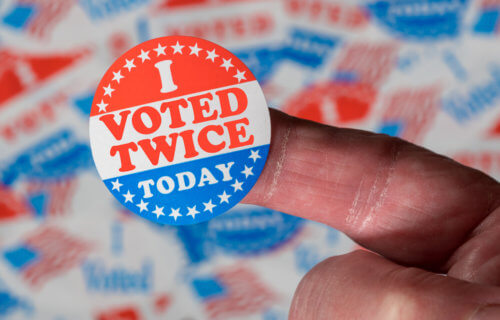STANFORD, Calif. — Are people who lived decades and even centuries ago really casting ballots in 2020? The subject of voter fraud is on everyone’s mind these days, but a new study released just before the 2020 U.S. elections finds instances of dead voters being sent ballots have been exceedingly rare in the past.
A team of researchers at Stanford University set out to analyze about 4.5 million voter records from the state of Washington between 2011-2018 in search of any signs of voter fraud. Among that gigantic dataset, study authors flagged only 14 instances as possible votes from beyond the grave. While these ballots may have been stolen and tallied on behalf of a deceased individual, researchers say it’s impossible to say if each of these situations was indeed outright fraud.
Each voter’s name was cross referenced against death records (full name, gender, county). Dates of birth were collected from obituaries to ensure no mistakes were made due to people sharing the same names.
“We’re talking about 0.0003 percent of all voters over an 8-year period,” study leader Andrew Hall, a senior fellow at the Stanford Institute for Economic Policy Research (SIEPR), reports in a university release. “We can’t even say for sure that these 14 instances are fraud, What we can say for sure is that, at least in Washington, this form of fraud is extraordinarily rare.”
Has the pandemic made voter fraud fears come true?
Somewhat surprisingly, this is one of the first scientific studies to ever focus specifically on deceased voter fraud. While the data only pertains to Washington state, Hall says his findings suggest that deceased voter fraud just isn’t a widespread or prevalent problem in U.S. elections.
Of course, COVID-19 has led to millions of Americans opting to mail-in their vote this year. In turn, President Trump and his team have insisted for months that mail-in ballots will cause “catastrophic” voter fraud. A few months ago, Donald Trump Jr. posted on social media suggesting that up to eight percent of mail-in votes in this year’s Michigan primary had been cast by dead people.
The study’s authors just don’t see much historical or factual evidence to back up any of these claims or suspicions.
“As states expand vote-by-mail during the pandemic, many people have raised that concern that mail-in ballots are sent to dead people, stolen, and counted in elections,” Hall says. “We find that this type of fraud is likely to be extremely rare in states that take basic precautions.”
Keeping the vote secure is getting easier
To be fair, voter fraud in general has been a topic on the lips of American politicians for centuries. From bribes to duplicate ballots, political candidates have been suspected of cheating the vote in their favor for a long time. That being said, it isn’t 1840 anymore, and researchers find little evidence of widespread voter fraud in modern American history. Why? States do a good job of stopping such attempts.
Moreover, of all the possible ways to “rig” an election, using ballots sent in by the deceased is far from the most efficient or covert. Simply put, it’s incredibly easy to identify if thousands of dead people are voting.
“Who votes and who dies are both matters of public record,” Hall explains. “This makes this particular claim directly testable.”
In fact, like many states, the state of Washington checks public death records and removes deceased voters from the rolls. They take special care to prevent dead people’s ballots from being counted. While the state of Washington already has the data to conclude that this form of fraud is rare, Hall points out that “it is important for independent academic researchers to evaluate the claims of state authorities about the security of our elections.”
Some states do Election Day better than others
Notably, Washington is the perfect state for this study. This is due to the fact that in 2011 the state government switched over completely to universal vote-by-mail. It’s important to note the difference between universal vote-by-mail (every registered voter is mailed a ballot) and more traditional absentee voting (voters can choose to vote by mail if they so desire). Additionally, Washington keeps meticulous records for voters (DOB, vote history), and has made all death records accessible to the public.
“And we’re not saying anything about whether vote-by-mail is ‘good’ or ‘bad’ — just that this one particular claim about it seems false,” Hall clarifies.
Not all states go to the lengths that Washington does to ensure no deceased voter fraud occurs; such as using unique barcodes for each voter and removing dead individuals from the voter database. That being said, the study’s authors believe that the basic precautions taken by all 50 states should be enough to make this form of voter fraud “unlikely in any circumstance.”
“Given how hard this fraud is to carry out at scale, and how large the penalties are, it’s not surprising that very, very few people attempt it,” Hall concludes. “Although our results can’t be immediately generalized, this type of fraud is likely to be vanishingly rare for states that take similar precautions.”
The full study was published by the Stanford Institute for Economic Policy Research (SIEPR).
